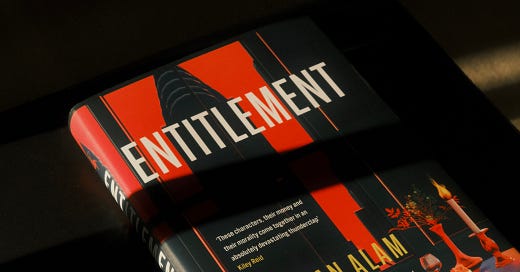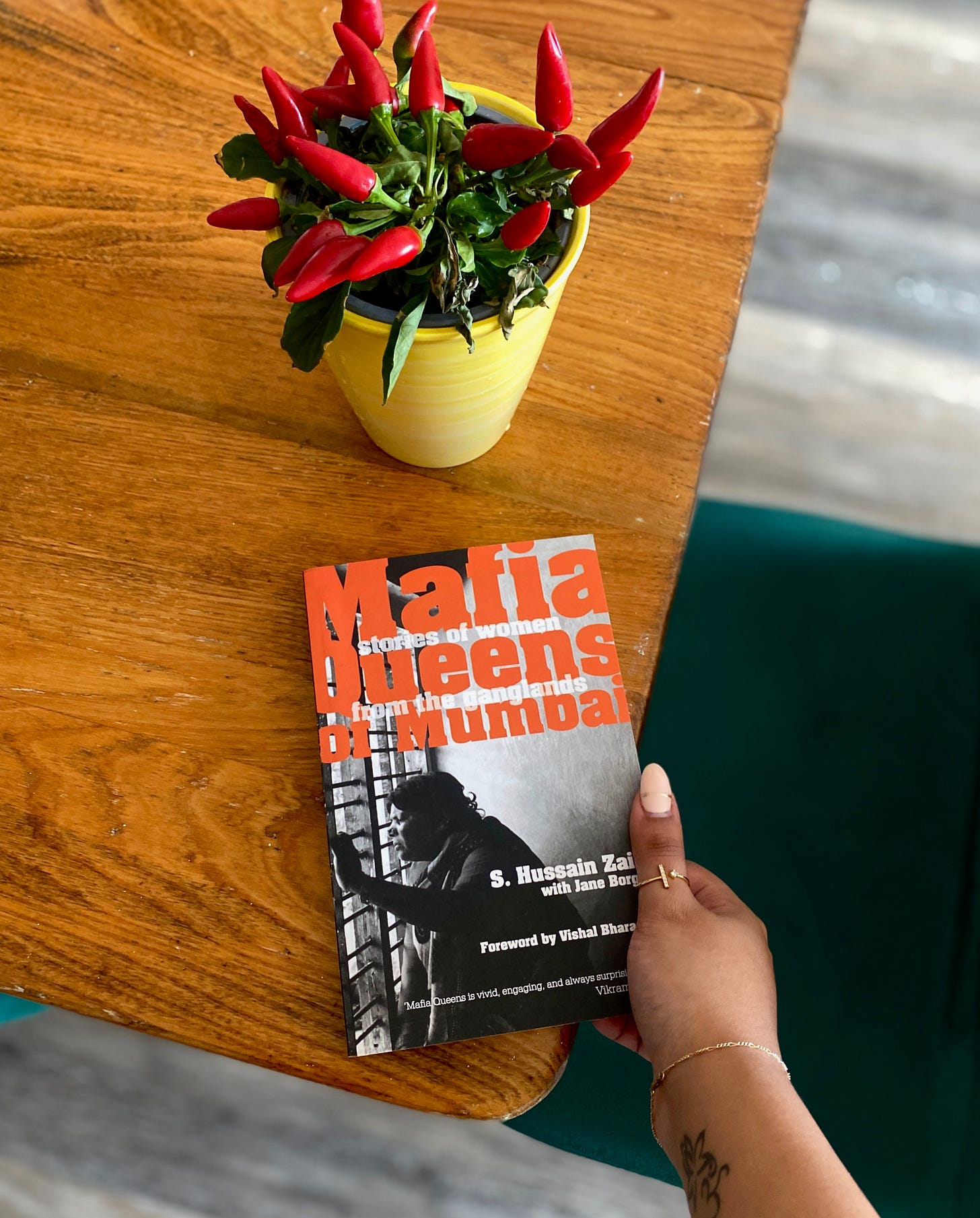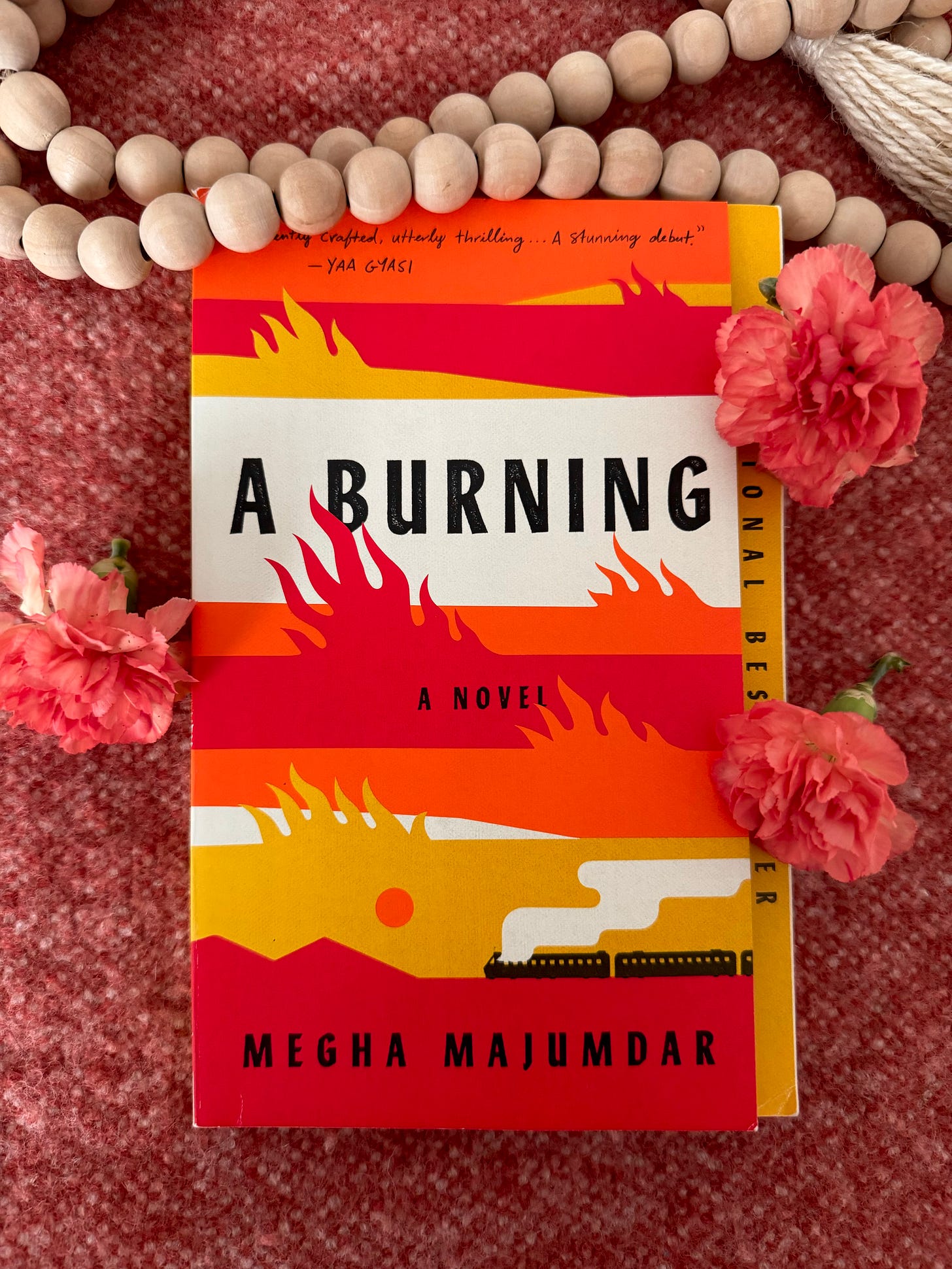Dear readers,
Remember the acclaimed novel “Leave the World Behind?” Its author, Rumaan Alam, recently took the stage at the Manchester Literature Festival to promote his new release, “Entitlement”—and we were there, book in hand. Three-quarters of the way through the novel, grappling with mixed emotions about the protagonist, Brooke, we thought, “We need answers: are we supposed to like her or not?”
When it came time for him to sign our copy, we couldn’t resist airing our confusion. His response? It inspired the angle for this edition.
In short, he said: his protagonist needs to have experiences that reveal themselves, and when focused on that, he doesn’t pause to consider whether they’re good or bad. That got us thinking: if the protagonist doesn’t need to be "good," do they need to be likable for the story to land positively with readers?
Brooke lands squarely in our pile of unlikable leading characters, along with a few other unforgettable ones:
Maali Almeida, the sharp-tongued, morally ambiguous narrator of Shehan Karunatilaka’s “The Seven Moons of Maali Almeida.”
Dr. Oliver Harding, the self-centered, cringeworthy academic from Sonora Jha’s “The Laughter.”
Nayan Olak, the sanctimonious union leader whose life unravels both professionally and personally in Sunjeev Sahota’s “The Spoiled Heart.”
Noomi Wadia, the headstrong and impulsive protagonist navigating the complexities of an upper-class Indian enclave in Naheed Phiroze Patel’s “Mirror Made of Rain.”
But we still liked these books. “The Seven Moons of Maali Almeida” offered a narrative like no other, blending dark humor with an intricate exploration of life, death, and the afterlife. The mystery, wit, and central character caught between worlds made it a fascinating read, even with Maali’s complex and often frustrating personality.
On the other hand, “The Laughter” forced us to reflect deeply on power dynamics and the messiness of human interactions in academic and social settings. Dr. Harding’s twisted stream of consciousness is grating yet captivating. The reading experience stayed with us long after we turned the last page.
And while we might not have voted for Nayan Olak or stayed close friends with Noomi Wadia, their flaws make them strikingly realistic—whether as politicians or companions we might encounter in real life. Over the course of ~300 pages, we found it hard to fully loathe them, instead slowly developing empathy for the intricate circumstances that shaped their choices.
This all led us to think: when a book has other redeeming qualities or presents a unique point of view, the questionable characters can often be seen as part of the story’s charm. Sometimes, it’s not about whether we like the characters, but whether they serve a greater purpose in the story: do they challenge us to confront uncomfortable truths, reflect on our own biases, or develop unexpected empathy for perspectives we might otherwise dismiss. Unlikeable protagonists can make for a compelling read, perhaps even more so, pulling readers into a more gripping exploration of moral complexities.
Until next time,
Mishika and Sri
A literary retreat in the Cotswolds, England
Calling all who dream in pages and cherish quiet moments (yes, that’s you!). From February 21-23, 2025, we’re escaping to a retreat just outside Shakespeare’s birthplace. It’s a weekend to read, recharge, and connect with fellow book lovers, hosted by Boutique Book Breaks.
With fewer than five spots left, we are thrilled to share a special promotion code: BGB10. We’d love for you to join us!
Entitlement by Rumaan Alam
Set during the Obama years, “Entitlement” is refreshingly free from the COVID-19 or Trump-era weight that has defined recent fiction. Instead, it offers a quieter political backdrop, one that allows space for readers to focus on the characters—particularly Asher Jaffee, an elderly billionaire, and Brooke Orr, a young Black woman navigating the complexities of her role within his charitable foundation. Alam examines the layered power dynamics of wealth distribution, inviting us to consider the morality of deciding who deserves help, and what influence money exerts over people and organizations.
What’s perhaps most striking is that Alam doesn’t ask us to like these characters. Asher and Brooke are flawed, morally complex, and largely difficult to root for. “Entitlement” dares readers to sit with discomfort, to question their own values, and to find meaning in characters who are perfectly imperfect.
Adding to this complexity, New York City itself takes on a life of its own, serving as more than just a setting but a character in its own right. As a recent transplant from New York, I found comfort in diving into a story set against Manhattan’s familiar hum. Alam’s narrative captures the city’s restless energy as a backdrop for growth, career twists, and financial ambition. Reflecting on this, Alam remarked, “It’s liberating to write about a place that has been written about so often.” In “Entitlement,” he breathes new life into that familiar cityscape, making its discomforts resonate even more profoundly.
📚 Get your copy of “Entitlement.”
Mafia Queens of Mumbai by Jane Borges and S. Hussain Zaidi
Reviewed by: Monica Chakraborty
In this investigative journalism piece, S. Hussain Zaidi explores the unsung powers of the Mumbai underworld, the mafia queens. “Mafia Queens of Mumbai: Stories of Women from the Ganglands” is a complex anthology of women in crime. Motivated by a myriad of factors such as greed, love, lust, pride, and revenge, these women rose to the height of power within crime syndicates—at a time when such feats were rare for women.
My interest in the book was sparked by the popular Sanjay Leela Bhansali film “Gangubai Kathiawadi.” While some stories felt more complete than others, each woman's life was both fascinating and often tragic, yet they remained resilient in the face of their circumstances.
In the captivating stories “Femme Fatale” and “Mobster’s Moll,” Zaidi sheds light on sex workers, the politics of gangs, anti-crime initiatives, blackmailing in Bollywood, and many other aspects that are chess pieces on the board of Mumbai’s dark underbelly.
Zaidi’s own investigative experiences, combined with interviews from those who knew these women, provide a rich and nuanced portrayal. These women are neither painted as cruel vixens nor helpless victims, but as complex individuals shaped by their choices and circumstances.
Despite their illegal activities, I found myself rooting for the mafia queens, recognizing their humanity and resilience. It's astonishing that their stories have faded into obscurity, and Zaidi's work in bringing them to light makes this book a compelling and worthwhile read.
📚 Get your copy of “Mafia Queens of Mumbai.”
A Burning by Megha Majumdar
Reviewed by: Maleeha Hamidi
Though published in 2020, “A Burning” still cuts deep, exposing how politics can have a devastating impact on individuals and unravel the threads of our social fabric. Megha Majumdar’s debut novel follows Jivan, a young Muslim girl from the slums of India accused of terrorism because of a thoughtless Facebook comment. Majumdar also introduces PT Sir, Jivan's former gym teacher, and Lovely, a trans woman Jivan was teaching English to.
Each character represents larger socio-political issues that are present in India today. Jivan’s story highlights the prejudices against Muslims as Hindu-Nationalism rises throughout the country. PT Sir's shows the corrupting power of political propaganda, and how easy it is for an average citizen to become involved in deeply serious and unethical corruption with the right amount of bribery and ego stroking. Lovely’s reveals the struggles of trans women marginalized in South Asian society, simply for existing as their true selves.
Social class connects all three characters, shaping their fates and difficult choices. In Majumdar’s India, lacking money or status makes it nearly impossible to thrive, forcing people to make painful, sometimes unforgivable decisions. Powerful, beautifully written, and rich with emotional depth— I’ve sent photos of passages to friends and family rather than attempt to convey how impactful Megha Majumdar’s writing was. As a South Asian American Muslim myself, I hold this novel near and dear to my heart. Thank you, Megha, for being brave enough to write it.
📚 Get your copy of “A Burning.”
To view all of the books featured on our page and/or purchase them from independent booksellers:









Agree that a book can absolutely be great without being likeable (I have a strong inclination toward such books).
I do enjoy an unlikeable character as they usually shine a light on those parts of ourselves that we would rather not reveal - so even if I hate them, I understand them.